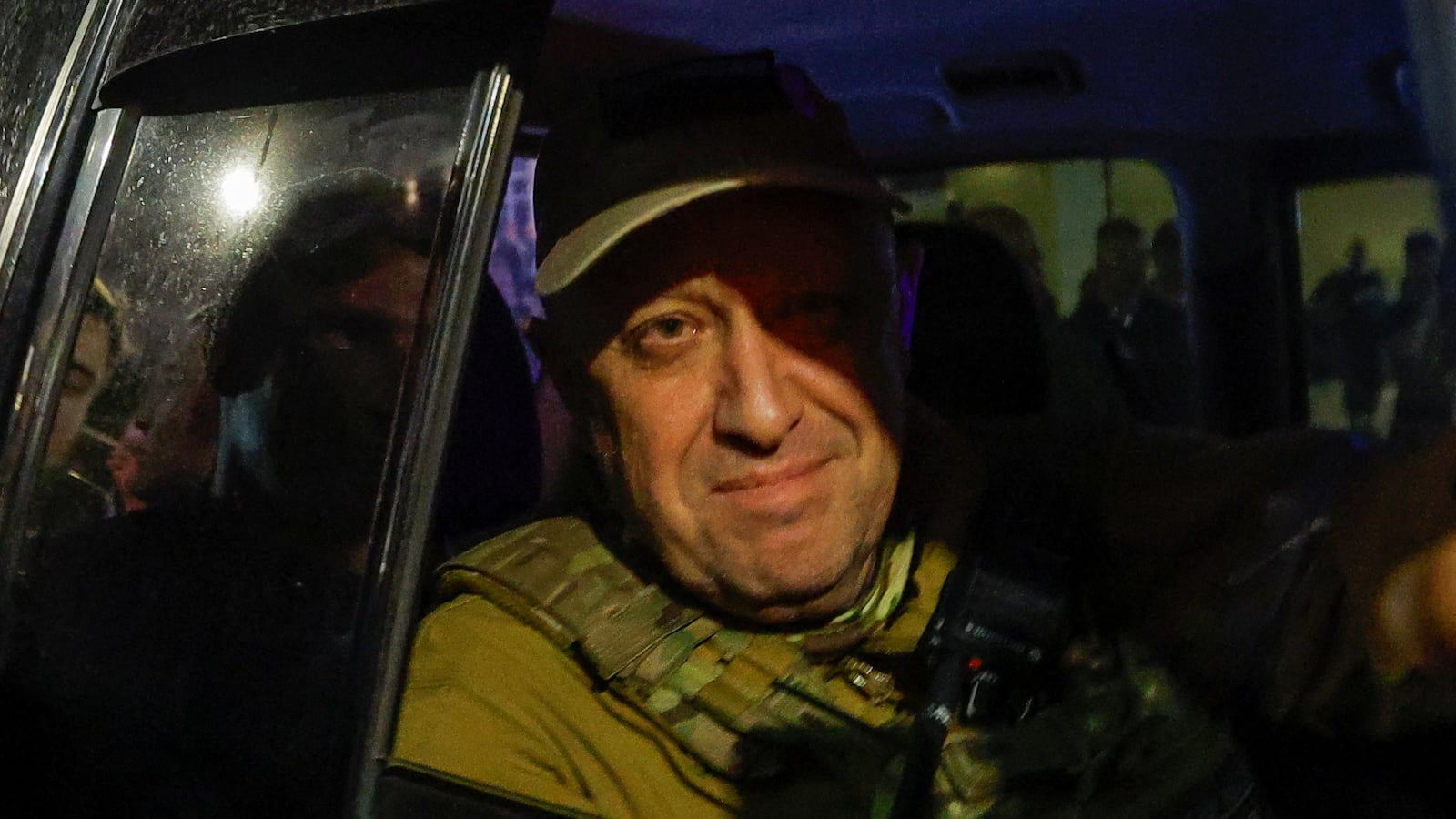Field camps were under construction in Belarus on Monday for Wagner mercenaries fighting under Yevgeny Prigozhin, who was just exiled to the country following his attempted mutiny in Russia, according to independent Russian news outlet Verstka.
“We are working, we are already working today. Tomorrow, before lunch, the task is to [build],” one source told Vertska.
One relative of a Wagner fighter told the outlet they were told they would be sent to Belarus. The camps under design are reportedly preparing for 8,000 beds, will stretch 24,000 square meters (258,334 square feet), and will be about 120 miles from Belarus’ border with Ukraine.
In a recorded address to the nation late on Monday night in Russia, President Vladimir Putin confirmed that any Wagner fighters who did not “shed blood” could sign a contract to join the Russian military or go to Belarus.
Prigozhin ordered his troops to march on Moscow over the weekend, threatening to remove Russian Defense Minister Sergei Shoigu over the way Shoigu has handled the war in Ukraine. And although Prigozhin called off the rebellion after negotiating with Putin and Belarusian strongman Alexander Lukashenko to broker a deal that dropped criminal charges against Prigozhin and left him exiled to Belarus, the fate of Prigozhin and his Wagner mercenary group remains uncertain.
The Daily Beast has not been able to verify the reports of the construction in Belarus. But the report of new field camps comes days after the Kremlin hinted that Wagner could be dissolved moving forward, and could provide some clues as to the future of Prigozhin’s mercenary fighters.
Prigozhin had announced he had called his troops back to the field camps in Ukraine, where they have been working to stage attacks against Ukrainians. It was not immediately clear if all of the troops headed for Ukraine, however.
And with possible field camps in Belarus, Prigozhin may be able to continue operating Wagner after all, just days after they staged the largest challenge to Putin’s decades-long hold on power in Russia.
Belarus has been providing Russia a staging ground for their war in Ukraine since Russia’s invasion last year. Lukashenko, whose leadership of Belarus has devolved into serving as a puppet of Putin in recent years, has vowed to continue to allow Russia to use Belarusian territory.
Just how much of a threat Wagner and Prigozhin, a former close ally of Putin, will be able to pose to Putin’s grip on power remains to be seen. It’s not clear if potential Wagner camps in Belarus would be a threat to Russia.
Given the nature of Lukashenko’s relationship with Putin, it’s unlikely that Lukashenko will sanction Prigozhin-led activities in Belarus without Putin knowing about them, and approving of them, Kenneth Yalowitz, a former U.S. ambassador to Belarus, told The Daily Beast.
“Putin might have dictated the terms to Lukashanko. I kind of doubt that Lukashenko could have committed Putin to all these things… without Putin’s assent,” Yalowitz said.
Questions had already begun to bubble up over whether Prigozhin will be able to stage attacks from Belarus; Polish Prime Minister Mateusz Morawiecki said Poland is boosting defensive preparations on its borders with Belarus and “anticipating attacks.” It’s also unclear if Prigozhin will be able to stage attacks against Ukraine as well.
But with 25,000 Wagner troops, much of Prigozhin’s future still hangs in the balance.
Prigozhin at this point is a “wild card,” Yalowitz said, and could potentially pose a problem for Lukashenko too.
“If they’ve evacuated into Belarus, what’s their purpose? I mean, you know, they could be a threat to Lukashenko as well,” he said. “For Lukashenko, you would have, in effect, almost like Russian troops occupying Belarus, and that will not go down very well with his public.”
Some Wagner troops might be headed to work for the Russian Ministry of Defense. As part of the agreement that has exiled Prigozhin, Wagner troops that didn’t back the rebellion are to be offered contracts with the conventional Russian military.
It’s a stipulation that echoes earlier efforts by Russia’s Ministry of Defense to force Wagner fighters into the conventional military—efforts that Prigozhin himself had rebuffed and could have contributed to his motivation to stage the mutiny.
In the meantime, there are indications that Putin is still working to dampen Prigozhin and Wagner’s power. Russia is cracking down on private military companies (PMCs) like Wagner, according to Andrei Kartapolov, the head of the State Duma Defense Committee. Kartapolov said Monday he is working on drafting a bill that will regulate PMCs more.
But he predicted nothing would change before the autumn, according to state-owned media outlet TASS.
Authorities shut down Prigozhin’s social media page on Vkontakte, and several recruiting sites were shuttered as well, according to TASS.
For now, Wagner is recruiting in Novosibirsk, according to TASS. And a Wagner staff member confirmed the group is working to operate normally, according to Fontanka SPB Online.
“Everything remains unchanged for us,” the staffer said. “We are working as usual.”
Recruits are being offered 240,000 rubles, or around $2,800, plus a bonus if they make it to Ukraine, according to Fontanka SPB Online.
Meanwhile, although Kremlin spokesperson Dmitry Peskov said Russia had dropped charges against Prigozhin for starting the mutiny, a criminal probe is ongoing, TASS reported. The FSB continues to investigate Prigozhin, according to Kommersant and other Russian outlets.
Signs emerged Monday that Prigozhin may be working to spin his mutiny as an act of defense, rather than a rebellion. In an audio recording, he claimed he staged the rebellion following an attack on his troops, to prevent Wagner from getting shut down.
“We started our march because of an injustice,” he said, according to an AP translation.
The goal was “not toppling the Russian authorities,” he said, according to the War Translated project.
And although the Kremlin said Prigozhin’s personal security is a “guarantee” of Putin’s, Prigozhin is not necessarily safe from Putin’s hitmen moving forward.
“There are just questions everywhere. Is Prigozhin a man who is going to be hunted down in Belarus?” Yalowitz said. “With 10,000 troops at his disposal, he's not going to be a very easy target to take down.”
It’s unlikely Prigozhin will go belly-up for Lukashenko at this stage, Yalowitz predicted.
“Would he be loyal to Lukashanko? No. He’s not going to be loyal. He’ll be loyal to himself,” he said.
Prigozhin’s whereabouts were uncertain as of Monday. He was seen leaving Rostov-on-Don in southern Russia on Saturday after announcing he was calling off the rebellion. Unconfirmed reports circulated Monday suggesting he had been spotted in Minsk, the Belarussian capital.
Lukashenko’s press service said Monday it did not know if Prigozhin had arrived in Belarus.









